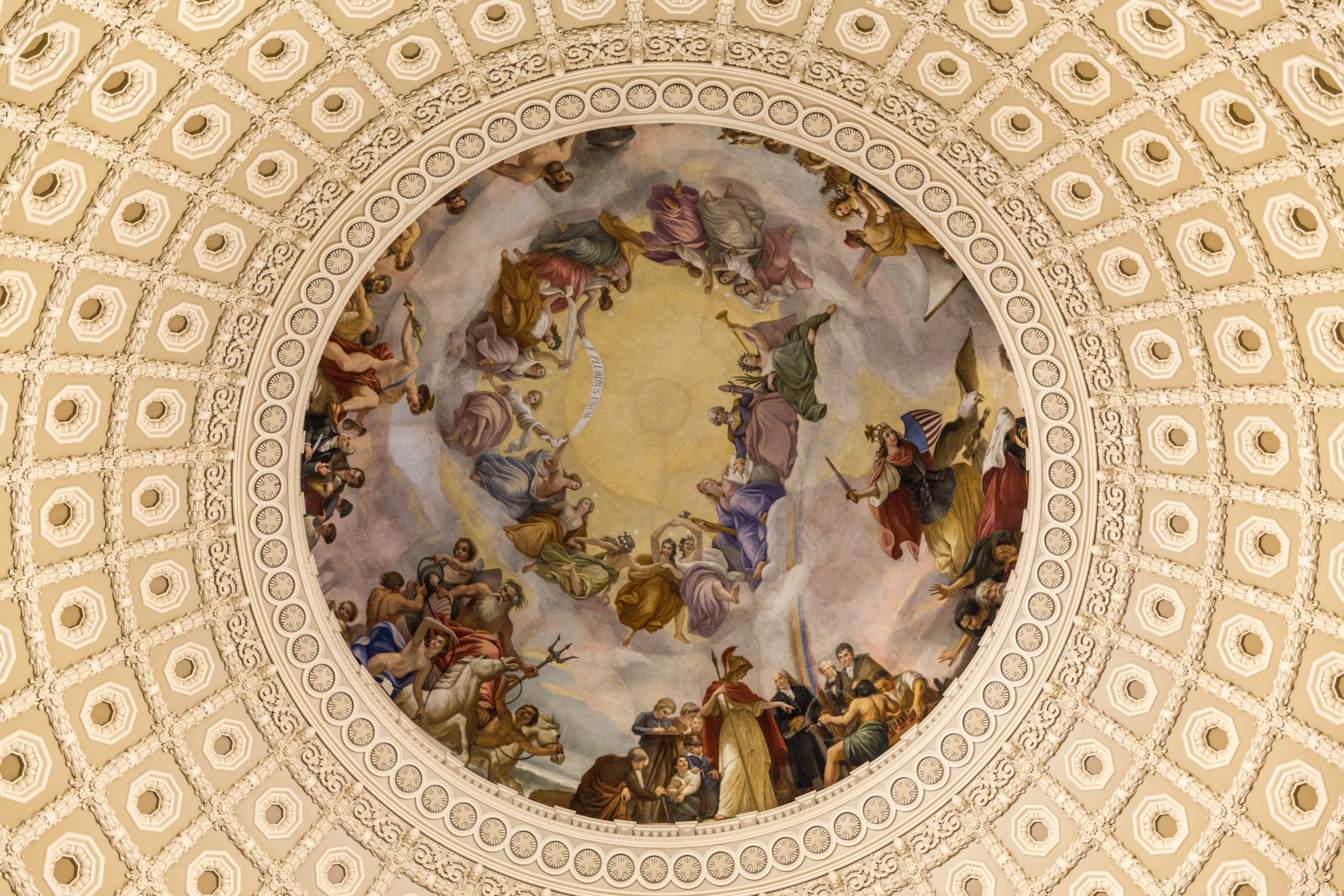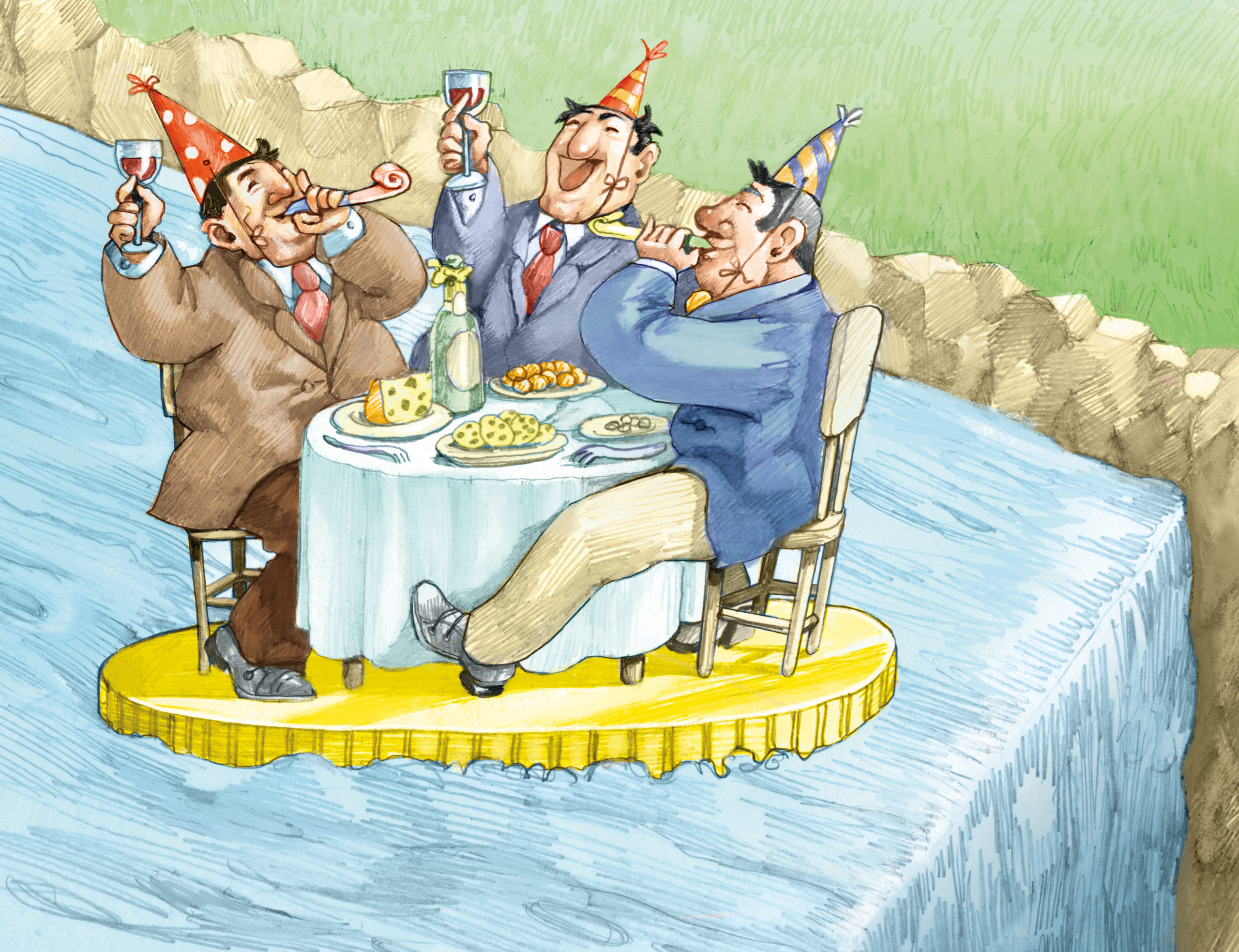

As part of American Compass’s “Party Foul” series, which seeks to set forth mistakes and self-service by the political establishments of both parties, Henry Olsen has played penitent and confessor for the Right. Republicans have committed, according to him, “three deadly sins,” in the form of market fundamentalism, snobbery, and hubris. I will happily agree that those are three of the sins of the American Right. But while Olsen ties snobbery and hubris primarily to Republican religiosity, separating them out from market fundamentalism, I consider the three of a piece with each other, and Olsen’s concern about GOP Christianity a bit of a red herring.
Olsen defines “free-market fundamentalism” as “the notion that whatever happens in private affairs is good per se and that government action can never be countenanced to restore justice to our lives, nor will it succeed if tried.” So far, so good; that will work for me, for now. Snobbery is how he describes the carryover of the Republican party’s WASP past into the present, so that “[t]oo often the Right gives the impression that it is only open to people with this cultural background and set of beliefs—that one must first believe in the Christian God before one can believe in the Republican platform.” Never mind that the mainline churches of the old WASP establishment now skew very Democrat, there is apparently some religious bigotry in GOP that requires uprooting. Combining these two prior sins for Olsen is hubris. Republicans indulge in hubris “by exalting two particular types as superior: the businessman and the pious man.” This is, according to Olsen, why Mitt Romney and Ted Cruz have not been more electorally successful.
Conceding that in the last couple decades of presidential primaries there has been a strong assumption successful Republican candidates will show deference to Evangelical Protestants, I don’t know how a movement away from religiosity will correct the snobbery and hubris that has kept the working class and poor from voting Republican. It is a middle-class and middle-brow quirk to be an atheist or agnostic upset by all the cultural Christianity that makes up American kitsch. As I have argued in “The Commons” before, and as fellow contributor Chris Arnade’s journalism demonstrates clearly, faith and religiosity—though, perhaps, unorthodox or noninstitutional—is a central part of the lives of the country’s most vulnerable citizens, of all colors and ethnicities. Ordinary people trying to get by, and perhaps recent working-class immigrants especially, aren’t likely to be offended by references to spiritual warfare or declarations of love for Jesus Christ. That takes at least a college degree.
The snobbery and hubris Olsen condemns in the campaigns and rhetoric of men like Romney and Cruz have far more to do with free-market fundamentalism than religion as such. Setting aside how those men as individuals think and feel about the poor and precarious—and I have every reason to trust in their personal charity—language of “givers and takers” or a certain kind of sanctimony comes far more from a mostly unstated assumption that the market is, in a technological age, nature’s sorter, red in tooth and claw, separating out the fit from the weak. Olsen puts it clearly:
A commitment to individual freedom cannot, however, transform into a dogmatism that blinds its followers to the misery that individual human beings can cause to one another, including misery delivered by private means. Human history teaches us that the vast majority of people do not aspire to greatness, are not entrepreneurial risk takers, and will submit to bad deals to avoid death or penury. The very virtues that lead to good in the hands of the talented and the virtuous can, and too often do, lead to exploitation at the hands of the callous and the corrupt.
What is going on here, what produces the snobbery and hubris that is a true sin of the American Right, is a failure to speak frankly about inequalities and the responsibilities commensurate to them. That “the vast majority of people do not aspire to greatness” requires that the great be shepherds.
Detached by time and miseducation from its origins in the French Revolution, when the poles of movement and order, terror and monarchy, did in fact divide the National Assembly into a left hand and right hand, the Left and Right political spectrum can perhaps best be defined on an axis of equality to hierarchy. The Left tends to believe the essential equal-standing of human beings—a concept inherited from Christianity with its creator God of both perfect love and perfect justice—demands visible expression in the political realm, a realm which it expands to consume others as it sees more inequalities to rectify. The Right, though usually acknowledging an original or final metaphysical equality, receives the inequalities of the physical and spiritual here and now as natural, necessary, and (here’s where it gets tricky) ennobling; many and various hierarchies, which every person finds herself in, make up the texture of individual and communal flourishing and allow for the political to be a highest but by no means comprehensive sphere. This mixed regime of life is the republican idea, that in each hierarchy a person learns to lead and follow, command and obey, rule and be ruled in turn.
Odd then, it seems to me, that the ostensibly Right-leaning major party in American politics is so much worse at talking about inequality than its rival on the Left. Part of the realignment I hope these unsettled times help produce must be frank talk from Republicans not named Tucker Carlson or Oren Cass or Henry Olsen about the responsibilities commensurate to status, and not just so much more mouth breathing about what has been earned. To advocate for strong measures of social support, politicians of the Left such as Bernie Sanders or Elizabeth Warren begin from clear-eyed assessment of where things are unequal. You cannot exalt a valley or make low a mountain or hill if you do not see valley, mountain, and hill first. The Right ought to have an even more detailed account of all these crookednesses and rough places, since it hopes to know which are basically permanent, best left to God.
Instead, through the historic influence of liberals and libertarians in and on the Republican party, there is a tendency toward lame leaning on the sufficiency and self-evidence of humanity’s original equality, a blind eye to many and obvious basic inequalities, and an assumption that the playing field is basically fair enough for everyone to prove their worth. This is the center-Right of “fiscally conservative, socially liberal.” This has been the road of decline paved with no intentions at all, except lazy selfishness and self-satisfaction, leading down to stagnation, electoral defeat, and ruin for the country.
There are three duties that would set apart a true elite, a just elite who, honest about their place, stand braced under the weight of their responsibilities. The first is the restraint and punishment of vice, and the general maintenance of law and order, so that the many can live quiet lives of quiet virtue. The second is the direction and regulation of trade and manufacturing so that all, according to the capacity of each, may have some industry in harmony with their fellow citizens and the support of a sound welfare system to be their providence in cases of misfortune, foolishness, or simple weakness. And the third and final duty of a true elite is to preserve what beauty has been inherited from our ancestors, to make more beautiful things in this country, and to teach—by schools and speeches, by monuments and public works, by laws, by parks, by every task they lead in—We the People to seek the highest that is in us.
Recommended Reading
Political Analysts from Left & Right Explain How Their Own Side Fails the American People
PRESS RELEASE—American Compass’s October collection explores how Democratic and Republican establishments have been co-opted by a ruling class with little connection to most Americans’ needs.
Conservatism Must Be Chastened by Humility
If a realigned Republican Party is to emerge as a viable national political force, the ever-incisive Henry Olsen will be one of its leading architects. His American Compass essay, “The Three Deadly Sins of the Right,” once again shows us why. I would merely like to expand upon Olsen’s groundwork.
The Three Deadly Sins of the Right
Market Fundamentalism. Snobbery. Hubris.













